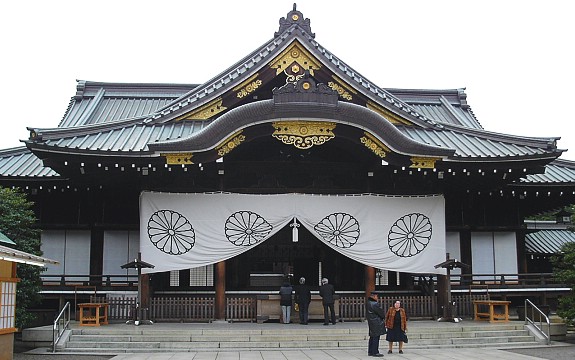(Photo Credit: www.japan-guide.com)
(BGF) – Yesterday, April 21st, 2014, Japanese Prime Minister Shinzo Abe sent a ritual offering to the Yasukuni Shrine. This article, written by Elaine Lies and featured on the Reuters website, discusses the reaction to Prime Minister Abe’s offering, as well as a recent court order from a Beijing court impounding a Japanese ship, the Baosteel Emotion. The Yasukuni Shrine is viewed by many as a “symbol of Japan’s past militarism” and honors Japan’s dead, including 14 individuals who were declared war criminals for their actions during World War II. In reaction, China and South Korea condemned the offering and expressed anger over Prime Minister Abe’s action. However, the Japanese Government contends that this offering was sent by the Prime Minister as a private individual, and thus the Government could not comment on the offering. Regardless, the offering has strained the already tense relations in the region. Click here to read the full article or visit the Reuters website.
Japan PM makes offering to Yasukuni Shrine, angers China, South Korea
By Elaine Lies
(Reuters) – Japanese Prime Minister Shinzo Abe has sent a ritual offering to the Yasukuni Shrine, seen by critics as a symbol of Japan’s past militarism, angering both South Korea and China on Monday and putting regional ties under further strain.
Adding to unease in the region, a Chinese maritime court in Shanghai seized a ship on Saturday owned by Japanese shipping firm Mitsui O.S.K. Lines, a move that Japan warned could have an adverse impact on its businesses in China.
The court said the company had failed to pay compensation stemming from a wartime contractual obligation. China’s Foreign Ministry said the disagreement was a normal commercial dispute.
Japan said the ship seizure, apparently the first time the assets of a Japanese company have been seized in a lawsuit concerning compensation for World War Two, was “extremely regrettable”.
“It is inevitable that this will have an adverse impact on Japanese companies in China,” said Chief Cabinet Secretary Yoshihide Suga. “We strongly urge the Chinese government to make the proper response.”
The spat over the ship was a “regular business contract dispute”, China’s Foreign Ministry spokesman Qin Gang said, adding that the government would safeguard the rights of foreign investors.
“This case has nothing to do with compensation from the Chinese-Japanese war (World War Two),” Qin told a regular news briefing.
“Nothing has changed in the Chinese government’s position on adhering to, and defending every principle in, the Sino-Japanese Joint Statement,” he added, referring to an announcement in 1972 that the two countries were establishing official ties.
At the time, Japan also recognized the government in Beijing as the sole government of China and China gave up claims to Japanese war reparations.
“China will continue to protect the interests and rights of foreign investors in China according to law,” Qin said.
“MISTAKEN ATTITUDE”
The offering by Abe, who visited the shrine in December but did not go in person this time, was sent just before U.S. President Barack Obama begins a three-day visit to Japan on Wednesday.
The United States has said it was “disappointed” with Abe’s shrine visit last year, which infuriated Beijing and Seoul.
China protested on April 12 after internal affairs minister Yoshitaka Shindo visited the shrine, where 14 Japanese leaders convicted as war criminals by an Allied tribunal after World War Two are honored, along with Japan’s war dead.
Abe made his latest offering to the shrine as a private individual so it was not the government’s place to comment, Suga, the chief government spokesman, told a news conference.
“It will not have an impact on the U.S.-Japan leaders meeting,” he said.
Qin, China’s foreign ministry spokesman, said Beijing had already lodged a protest with Tokyo, adding that Abe’s move reflected Japan’s “mistaken attitude towards history”.
“SLAP IN THE FACE”
China’s official Xinhua news agency condemned Abe’s offering as a provocative move that threatened regional stability and was a “slap in the face of the leader of Japan’s closest ally”.
South Korea’s Foreign Ministry also responded angrily.
“We deplore the fact that Prime Minister Shinzo Abe has romanticized Japanese colonialism and its war of aggression by paying tribute to the Yasukuni Shrine,” it said in a statement, noting it had happened despite expressions of concern from the international community.
Click here to continue reading.
